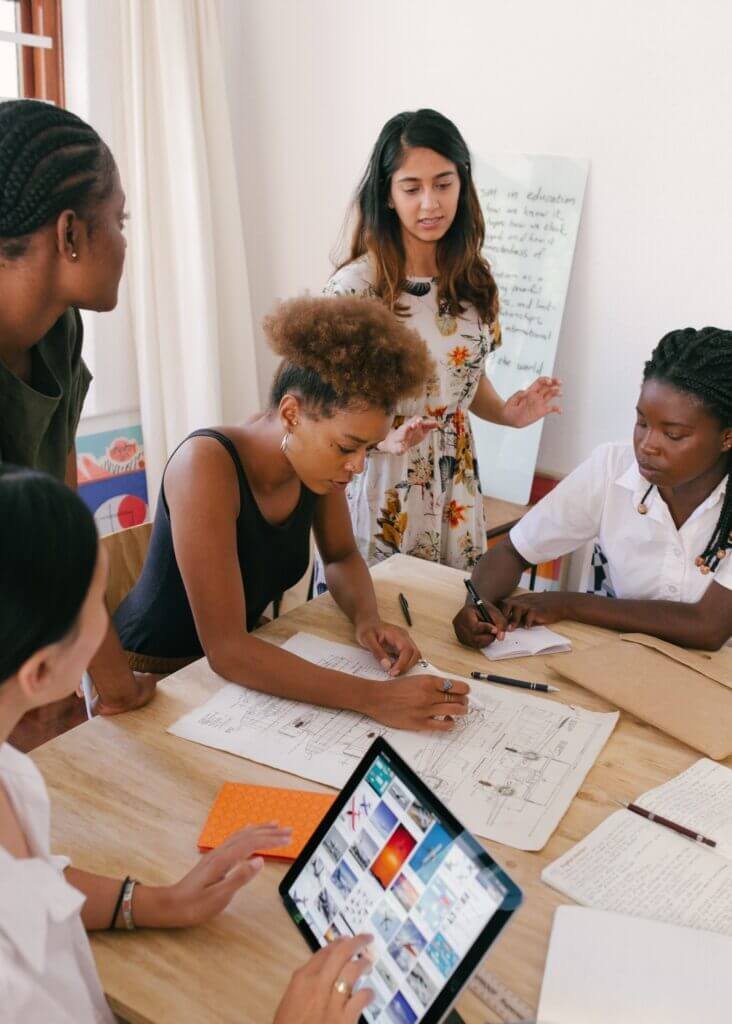Collaborating with other bloggers can be a wonderful way to expand your reach, share ideas, and create meaningful connections in the blogging community. It opens up a world of opportunities to learn from each other, cross-promote each other’s content, and even co-create content that resonates with both audiences. Whether it’s through guest posting, participating in blog hops, or hosting joint webinars, there are endless possibilities to foster collaboration and take your blogging journey to new heights.

Guest Blogging
Finding suitable blogs
When it comes to guest blogging, finding suitable blogs to contribute to is key. Look for blogs that align with your niche or industry and have an engaged audience. You want to find blogs that have a good reputation and a solid readership so that your guest post will get the exposure it deserves. Consider reaching out to bloggers who cover topics related to your own blog, as this ensures that their audience will have an interest in your content as well.
Pitching your guest post
Once you have identified suitable blogs, it’s time to pitch your guest post idea. Make sure to read through the blog’s guest blogging guidelines, if they have any, before reaching out. Craft a personalized email to the blog owner or editor, expressing your interest in contributing and briefly outlining your guest post idea. Highlight why your post would be valuable to their audience and include any relevant credentials or previous guest blogging experience. Be concise, friendly, and professional in your pitch.
Creating high-quality content
When writing your guest post, it’s important to create high-quality content that is valuable to the blog’s audience. Tailor your writing style to match the tone and voice of the blog you are contributing to, while still maintaining your own unique voice. Be sure to thoroughly research the topic you are writing about and provide accurate and well-researched information. Use compelling headlines and subheadings to make your content easy to read and navigate. Finally, proofread and edit your post before submitting it to ensure that it is polished and error-free.
Promoting your guest post
After your guest post has been published, it’s essential to promote it to maximize its reach and impact. Share the post on your own blog and social media channels, and encourage your audience to read and share it. Engage with the blog’s audience by responding to comments and participating in discussions related to your guest post. Additionally, continue to engage with the blog owner or editor by expressing your gratitude for the opportunity and offering to contribute again in the future. Collaborating through guest blogging not only expands your reach but also helps build relationships within the blogging community.
Collaborative Blog Posts
Choosing a collaborative topic
Collaborative blog posts are a great way to bring multiple perspectives and expertise to a single piece of content. When choosing a collaborative topic, aim for something that is relevant to all bloggers involved and has the potential to provide value to their respective audiences. Consider brainstorming ideas together and selecting a topic that allows each blogger to contribute their unique insights or experiences. By choosing a topic that aligns with everyone’s interests, you can ensure a successful collaboration.
Finding bloggers to collaborate with
Finding bloggers to collaborate with can be as simple as reaching out to your network or exploring social media groups and communities related to your niche. Look for bloggers who share similar interests and have a similar target audience. Reach out to them with a personalized and friendly message, expressing your interest in collaborating and proposing a specific topic or idea for the collaborative blog post. Be open to hearing their ideas and suggestions as well, as collaboration is a two-way street.
Assigning roles and responsibilities
Once you have found bloggers to collaborate with and have agreed upon a topic, it’s important to assign roles and responsibilities to ensure a smooth collaboration process. Clearly define each blogger’s role, such as who will be responsible for writing the introduction, main body, or conclusion of the blog post. Assigning responsibilities helps to divide the workload and ensures that each blogger has a clear understanding of their contributions. It’s crucial to communicate openly and establish deadlines to keep the collaboration on track.
Coordinating content creation
Coordinating content creation is essential to create a cohesive and well-structured collaborative blog post. Establish a timeline for each blogger to submit their contributions, allowing enough time for editing and revisions. Ensure that the overall tone and voice of the blog post remain consistent throughout. Consider creating a shared document or using a collaboration tool to facilitate communication and make it easier for everyone to review and revise each other’s work. By coordinating content creation effectively, you can produce a piece of content that showcases the collective expertise of all bloggers involved.
Interviews and Q&A
Identifying bloggers to interview
Conducting interviews with other bloggers is a fantastic way to provide valuable insights to your audience while building connections within the blogging community. When identifying bloggers to interview, consider those who are experts in your niche or have unique perspectives that align with your blog’s focus. Research their previous work and engagement levels to gauge their credibility and audience engagement. Reach out to them with an invitation to be interviewed, explaining why you find their insights valuable and how it will benefit your audience.
Preparing a list of questions
Before conducting the interview, it’s important to prepare a list of thoughtful and engaging questions. Tailor your questions to the blogger’s expertise or unique experiences to encourage in-depth and insightful responses. Research their background and previous work to avoid asking repetitive or generic questions. Consider mixing both industry-focused questions and personal questions to provide a well-rounded interview that not only educates but also allows the blogger to showcase their personality. Prepare more questions than necessary to ensure a smooth and flowing conversation.
Conducting the interview
When it’s time to conduct the interview, approach it with a friendly and conversational tone. Begin by welcoming the blogger and expressing your gratitude for their participation. Ask your prepared questions, giving them enough time to provide detailed responses. Active listening is key during the interview – pay attention to their answers and ask follow-up questions to delve deeper into the topic. Encourage the blogger to share personal anecdotes or experiences that make the interview engaging and relatable to your audience. Remember to record the interview with the blogger’s permission for accurate transcription and future reference.
Promoting the interview or Q&A
After the interview is complete, it’s important to promote it to ensure maximum exposure and engagement. Transcribe the interview or format it into a Q&A-style blog post that is easy to read and digest. Add relevant visuals, such as photos of the blogger or graphics that enhance understanding. Share the interview on your blog and social media channels, tagging the blogger and utilizing appropriate hashtags. Encourage the blogger to share the interview with their audience as well. Additionally, consider repurposing the interview into other formats, such as a podcast episode or video, to reach a wider audience.
Social Media Sharing
Building relationships on social media
Social media provides a valuable platform for building relationships with other bloggers. Start by following and engaging with bloggers whose content you resonate with or find valuable. Regularly like, comment, and share their posts to show your support and personality. Building relationships on social media is all about genuine interactions, so be authentic and interested in what others are sharing. Over time, these interactions can lead to collaborations, guest blogging opportunities, or simply a supportive network within the blogging community.
Sharing each other’s content
One of the simplest ways to collaborate with other bloggers is by sharing each other’s content. When you come across a blog post or social media post that you find valuable or interesting, don’t hesitate to share it with your own audience. By sharing each other’s content, you not only provide value to your audience but also help promote and support fellow bloggers. Tag the blogger or mention them in your post to give them credit and increase the visibility of their content. This mutual support can lead to further collaboration and a stronger blogging community.
Tagging and mentioning bloggers
When sharing content on social media, make an effort to tag and mention the bloggers or influencers you are collaborating with or showcasing. This not only increases the visibility of their content but also establishes a connection between you and the blogger. Tagging and mentioning bloggers in your posts can lead to higher engagement and encourage them to reciprocate by sharing your content as well. It’s a simple yet effective way to show appreciation and build relationships within the blogging community.
Engaging with their audience
To further strengthen your collaborative efforts and build connections, engage with the audience of the bloggers you are collaborating with. When you share their content or they share yours, make an effort to respond to comments and engage in discussions. By actively participating, you not only show support for the blogger but also establish yourself as a valuable contributor to discussions. Engaging with their audience allows you to expand your reach, gain new followers, and potentially attract new readers to your own blog.

Cross-Promotion
Creating a supportive network
Cross-promotion is all about creating a supportive network within the blogging community. Connect with other bloggers who share similar interests or target audiences. Actively participate in online blogging communities, whether it’s joining Facebook groups, participating in Twitter chats, or attending virtual events. Be supportive and engage with other bloggers’ content, sharing their work with your audience. Building a supportive network helps to amplify your reach, gain exposure to new audiences, and foster long-lasting relationships with fellow bloggers.
Sharing recommendations and testimonials
One way to collaborate and support fellow bloggers is by sharing recommendations and testimonials. When you come across a blogger or influencer whose work you admire, express your appreciation publicly. Write a recommendation or testimonial on your blog or social media platforms, highlighting their expertise, unique qualities, or the value they provide to their audience. Not only does this help build their credibility, but it also shows your support and strengthens your own reputation within the blogging community.
Promoting each other’s products or services
Collaborating through product or service promotion can be mutually beneficial for bloggers. If you have a product or service that aligns with another blogger’s audience, consider reaching out to them for a potential collaboration. Offer to promote their product or service to your audience in exchange for them promoting yours to their audience. This cross-promotion helps both parties reach new potential customers and expands their reach beyond their current audience. Remember to only collaborate with bloggers and products/services that align with your own brand values and audience interests.
Jointly hosting giveaways or contests
Hosting joint giveaways or contests is another effective way to collaborate with other bloggers. Partner with bloggers who have a similar target audience or niche and plan a giveaway or contest together. Determine the rules, prizes, and entry requirements collaboratively. This joint effort not only increases your promotional reach but also provides a fun and engaging experience for your readers and their audience. Collaborative giveaways or contests can generate excitement, increase engagement, and attract new readers and followers to all participating blogs.
Collaborative Projects
Identifying common goals
Collaborative projects require a clear understanding of common goals among all participating bloggers. Identify areas of shared interest, overlapping expertise, or complementary skills. Determine the scope and purpose of the project, whether it’s creating an ebook, hosting a virtual summit, or launching a joint podcast. By aligning your goals, you establish a strong foundation for your collaborative project and ensure that all participants are working towards a common purpose.
Brainstorming project ideas
Once you have identified common goals, it’s time to brainstorm project ideas that align with those goals. Gather all participating bloggers and engage in a collaborative brainstorming session. Encourage everyone to contribute their ideas and perspectives. Evaluate each idea based on its feasibility, alignment with goals, and potential impact. Consider the resources, time, and effort required for each idea. By involving all participants in the brainstorming process, you tap into a diverse range of creativity and expertise.
Assigning tasks and deadlines
To ensure a successful collaborative project, it’s crucial to assign tasks and set deadlines for each participant. Clearly define the responsibilities and deliverables for each blogger, taking into account their strengths and interests. Establish a timeline with realistic deadlines that allow for collaboration, revisions, and necessary adjustments. Regularly communicate and update each other on progress to prevent any delays or misunderstandings. By assigning tasks and deadlines, you create accountability and ensure that the project stays on track.
Collaborating throughout the project
Collaboration should be an ongoing process throughout the duration of the project. Regularly communicate and check in with each other to provide updates and discuss any challenges or roadblocks. Utilize collaboration tools or shared documents to facilitate communication and ensure all participants have access to project resources and materials. Encourage open and honest feedback to optimize the project’s outcomes. Collaborating throughout the project fosters a sense of teamwork and allows for collective problem-solving, leading to a successful and impactful end result.

Blogger Events and Conferences
Attending industry events
Blogger events and conferences provide valuable opportunities for bloggers to connect with industry peers, learn from experts, and gain exposure to new ideas and strategies. Research and identify relevant events in your niche or industry and make an effort to attend. Network with fellow bloggers, engage in discussions, and attend workshops or panel discussions. Offer to share your expertise by speaking on a panel or hosting a workshop yourself. By attending industry events, you not only expand your knowledge and skills but also establish yourself as an active and committed member of the blogging community.
Organizing blogger meet-ups
Organizing blogger meet-ups is a fantastic way to bring bloggers together in a more intimate and localized setting. Reach out to bloggers in your area or those attending the same industry events as you and propose a meet-up. Choose a venue and time that work for everyone and plan engaging activities that allow for networking, collaboration, and knowledge sharing. Organizing blogger meet-ups builds connections and relationships that can lead to future collaborations and ongoing support within the local blogging community.
Participating in panel discussions
Participating in panel discussions at industry events or virtual conferences is an excellent way to showcase your expertise and contribute to discussions that are valuable to the blogging community. When given the opportunity to be a panelist, prepare in advance by researching the topic, identifying key talking points, and rehearsing your responses. During the panel discussion, actively engage with other panelists and audience members, listen attentively, and provide thoughtful insights and ideas. Participating in panel discussions not only highlights your expertise but also strengthens your credibility and visibility within the blogging community.
Networking and building connections
Networking is a crucial aspect of collaborating with other bloggers. Make a conscious effort to network with fellow bloggers at events, conferences, or online platforms. Approach conversations with genuine interest, ask questions, and actively listen to others. Collect business cards or connect on social media to stay in touch after the event. Nurture these connections by regularly engaging with their content, sharing their work, and offering support. Networking helps to expand your reach, attract potential collaboration opportunities, and foster a strong and supportive community of bloggers.
Guest Hosting on Podcasts
Finding relevant podcasts
Podcasts have become a popular medium for sharing stories, insights, and expertise. Finding relevant podcasts to guest host on allows you to reach new audiences and showcase your knowledge and personality. Research podcasts in your niche or industry and listen to a few episodes to get a sense of the host’s style and the topics covered. Look for podcasts that align with your expertise and target audience. Reach out to the podcast host with a personalized email, expressing your interest in guest hosting and suggesting topic ideas that would resonate with their listeners.
Pitching yourself as a guest host
When pitching yourself as a guest host on a podcast, highlight your expertise and unique perspective. Craft a compelling pitch that clearly outlines the value you can provide to the podcast’s audience. Share any previous podcasting experience or media appearances to showcase your comfort with being on-air. Tailor your pitch to the specific podcast, addressing why you find their podcast valuable and how your content aligns with their themes and topics. Be concise, confident, and friendly in your pitch, ensuring that you stand out among other potential guests.
Preparing engaging content
Once you have been invited to guest host on a podcast, it’s important to prepare engaging content that will captivate the audience. Collaborate with the podcast host to determine the overarching theme or topic for the episode. Conduct thorough research and gather supporting evidence or personal anecdotes to strengthen your points. Prepare an outline or script to guide the conversation, allowing for organic discussion while staying focused on the main topic. Anticipate potential questions or counterarguments and develop thoughtful responses. Remember to inject your personality and enthusiasm into the episode to connect with the audience.
Promoting the podcast episode
After your episode as a guest host is released, it’s essential to promote it to increase its reach and impact. Share the episode on your own blog and social media channels, highlighting your guest appearance. Encourage your audience to listen to the episode and share it with their networks. Tag the podcast host and use relevant hashtags to enhance visibility. Express your gratitude to the podcast host and offer to reciprocate by sharing their podcast or promoting future episodes. Promoting the podcast episode not only shows appreciation to the host but also helps build relationships within the podcasting community.

Expert Roundups
Identifying a niche for the roundup
Expert roundups are popular blog posts that gather insights and opinions from multiple experts on a specific topic. To create an engaging and valuable expert roundup, it’s important to identify a niche or specific angle for the roundup. Determine the main focus of the roundup and how it relates to your blog’s niche or audience’s interests. Look for experts within that niche who have unique perspectives or experiences to share. By narrowing down the niche, you ensure that the roundup has a clear purpose and provides targeted expertise to your readers.
Reaching out to bloggers and experts
When reaching out to bloggers and experts for an expert roundup, personalize your email and clearly explain the purpose and value of the roundup. Make sure to address each person by name and explain why you have chosen them specifically for their expertise or unique perspective. Emphasize the benefit of being featured in the roundup, such as increased exposure, networking opportunities, or the chance to showcase their knowledge. Be respectful of their time and provide a clear deadline for their response or submission.
Collecting and compiling their responses
Once you have received responses from the bloggers and experts, it’s important to compile their insights and opinions into a cohesive and well-structured blog post. Review each response and extract the key points or quotes that best represent their expertise. Be mindful of the flow and structure of the roundup, arranging the responses in a logical order that tells a coherent story or provides valuable information. Use headings, subheadings, and bullet points to make the roundup easy to read and navigate. Finally, proofread and edit the roundup to ensure accuracy and readability.
Promoting the expert roundup
To maximize the impact of your expert roundup, promote it extensively across your blog and social media channels. Share snippets or quotes from the roundup on social media, teasing the valuable insights provided by the experts. Tag and mention the bloggers and experts in your posts to give them credit and encourage them to share the roundup with their audience. Create engaging visuals, such as quote graphics or infographics, to drive engagement and attract attention. Additionally, consider repurposing the roundup into other formats, such as a podcast episode or video, to reach new audiences.
Mutual Support and Collaboration Groups
Joining online support communities
One of the most effective ways to collaborate and receive support from other bloggers is by joining online support communities. Look for Facebook groups, forums, or other virtual spaces where bloggers gather to share experiences, ask questions, and provide support. Actively participate in discussions, offer advice, and engage with other bloggers’ content. Online support communities provide a sense of belonging and a platform to connect with fellow bloggers who understand the challenges and joys of blogging. These communities help foster a supportive network and can lead to potential collaborations and partnerships.
Engaging in reciprocal sharing and promotion
Reciprocity is an integral part of collaboration within the blogging community. Actively engage with and share other bloggers’ content to show your support. Comment on their blog posts, share their content on social media, and promote their products or services when relevant. By practicing reciprocal sharing and promotion, you contribute to the success and growth of fellow bloggers while establishing yourself as a member of a supportive blogging community. The more you support others, the more likely they are to reciprocate and support you in return.
Sharing opportunities and resources
Collaboration within the blogging community involves sharing opportunities and resources. If you come across an opportunity that is not suitable for you but might benefit another blogger, share it with them. This could be a guest blogging opportunity, a speaking engagement, or a collaboration request. Additionally, share useful resources such as helpful articles, industry research, or tools that could assist other bloggers in their journey. By sharing opportunities and resources, you contribute to the growth and success of your fellow bloggers and strengthen the bonds within the blogging community.
Providing feedback and advice
Offering feedback and advice is an essential component of collaboration within the blogging community. When requested, provide constructive feedback on blog design, content, or strategies. Share your experiences and lessons learned to assist fellow bloggers in their journey. Be honest yet supportive in your feedback, highlighting both the strengths and areas for improvement. Additionally, feel free to ask for feedback and advice when needed. By actively participating in this reciprocal exchange of valuable insights, you foster a culture of growth, learning, and improvement within the blogging community.



